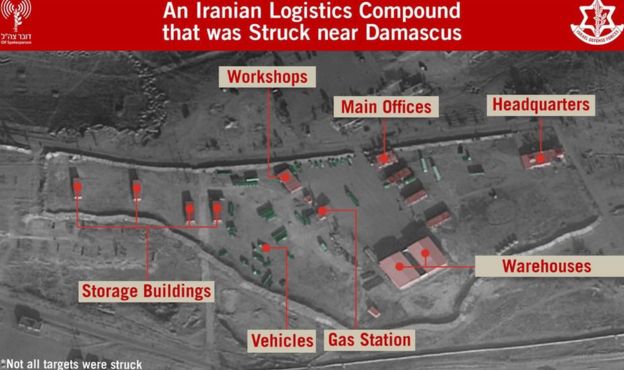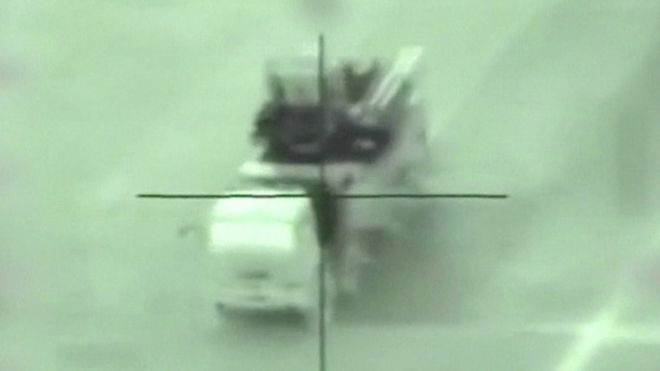Provocation and Response
"We will not let Iran turn Syria into a forward base against Israel."
"There are many radical Islamists, but Iran is the only one which is really [implementing its ideology across the region and into Africa.]"
"If Iran hits us with a drizzle here, we will hit them with a downpour there."
"If we get rain, they'll get a flood. I hope that we ended this chapter and that everyone understood."
Israeli Defense Minister Avigdor Liberman
 |
An Israeli soldier is seen next to signs pointing out
distances to different cities on Mount Bental next to the Syrian border
on Thursday. Lior Mizrahi/Getty Images
|
"Whoever hurts us, we will strike at him sevenfold."
"Whoever prepares to hurt us, we will act to strike him first."
Israeli Prime Minister Benjamin Netanyahu
"It is the right of any country in the region, among them Israel, to defend itself and destroy the sources of danger."
Bahrain Foreign Minister Khalid Al Khalifa
"Wherever Iran has confronted its enemies, it has advanced; we have gained our power through difficult battles."
Brig. Gen. Hossein Salami, head, Iran's Revolutionary Guard Force
"Iron Dome [Israel's missile interceptor system] intercepted the rockets. There are no injuries and no damage was caused to IDF positions."
"The Quds Force paid a heavy price last night. We have seen a demonstration of the IDF's intelligence and airpower capabilities."
IDF spokesman Brig. Gen. Ronen Manelis
 |
|
|

Under Russian President Vladimir Putin, Israel maintains close ties and a special appreciative warmth with Russia. And Benjamin Netanyahu visits with Vladimir Putin surprisingly frequently to ventilate Israel's concerns over Russian arms sales to Syria, providing an avowed enemy of Israel with technologically advanced weaponry which Israel will be facing sooner rather than later. Moscow's support of Syrian President Bashar al-Assad also brings it close to Iran.
So there is a conundrum in that Israel, hugely dependent on the United States for support and provision of advanced weaponry, is also dependent on America's most adamantly belligerent competitor on the world stage for dominance, with China breathing hot and close behind, though Russia seeks a military competitive edge while China's concerns are mostly mercantile.
Israel, as a result, takes care to launch its attacks on Syria, largely targeting Iranian military bases as well as Syrian ammunition caches, with the full knowledge of Moscow. So it undertakes these warning shots with care and Russia takes care not to interfere in a matter which it must regard as regional, to be settled by regional actors, even if it arms two-thirds of those actors.
Israel has blamed the Quds Force of the Iranian Revolutionary Guards for targeting Israeli army positions with 20 rockets, and Iran has responded by denying that it was responsible for the rockets, pointing the finger of responsibility on the Syrian military. Since the Islamic Republic of Iran appears to be orchestrating Syrian moves as well as establishing itself in permanent military bases in a partial occupation of Syria, it is their responsibility nevertheless and Israel delivered an indelible message.
According to Jean-Pierre Filiu, professor of Middle East studies at Sciences Po, Paris School of International Affairs, his analysis of the recent clashes, their import and outcome where both adversaries are placed in a situation which neither relishes but one has provoked nevertheless, escalation will not be pursued, but the events will lead to the "consolidation of new 'red lines' tacitly endorsed by Israel and Iran".
But it is Israel placing Iran on notice. And it is Iran forcing Israel to make that move. One where Iranian intelligence facilities and logistics compounds, a military base and other emplacements, along with munition storage warehouses of the Quds forces at Damascus International airport were targeted. Along with Syrian anti-aircraft batteries.
According to the Syrian Observatory for Human Rights, based in London, at least 23 people were killed in the Israeli strikes which Iranian media described as "unprecedented", which might also go a long way to describing Iranian conquests in Syrian, Lebanese, Iraqi, Gazan and Yemeni territories in its expansive claims for Shiite hegemony. Alongside its plans to destroy the State of Israel.
"The blistering Israeli assault was by far the most intensive Israeli action in neighboring Syria since the civil war broke out there in 2011. Israel has largely tried to stay on the sidelines, but has previously acknowledged carrying out over 100 airstrikes over the past seven years, most believed to be aimed at Iranian weapons shipments bound for the Hezbollah militant group."
Report: The Associated Press
 | ||
| The Israel Defense Forces released video of an air strike on a Syrian missile launcher Israel Defense Forces |
Labels: Conflict, Crisis Managment, Defence, Iran, Israel, Security, Syria
0 Comments:
Post a Comment
<< Home